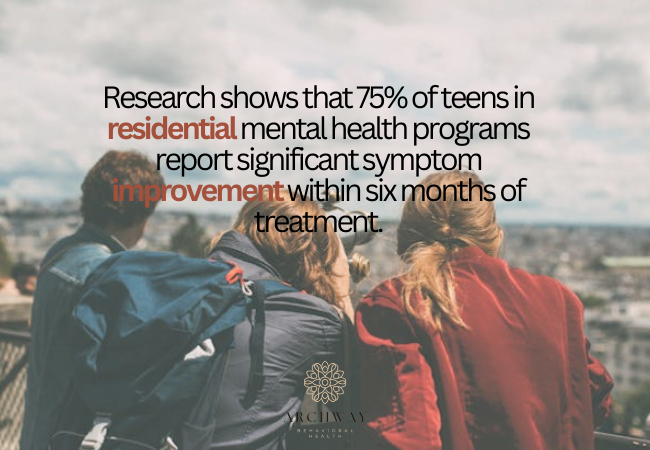Adolescence is a critical developmental period filled with emotional, social, and physical changes. However, many teens face significant mental health challenges that can disrupt their growth and well-being. Conditions such as anxiety, depression, bipolar disorder, and trauma-related disorders can severely impact a teen’s ability to succeed academically, build relationships, and maintain a healthy quality of life.
For teens experiencing severe or persistent mental health symptoms, residential mental health treatment provides an intensive, supportive environment where healing and recovery are the primary focus. At Archway Behavioral Health, we offer personalized mental health treatment programs designed to address the unique challenges teens face. Our comprehensive residential program empowers teens to stabilize their mental health, build resilience, and prepare for a brighter future.
What Is Residential Mental Health Treatment for Teens?
Residential mental health treatment is a live-in program designed to provide round-the-clock care for teens struggling with severe mental health challenges. Unlike outpatient or day treatment programs, residential treatment immerses teens in a therapeutic environment that offers structured support, intensive therapy, and a community of peers who understand their experiences.
Key Features of Residential Mental Health Treatment
- 24/7 Supervision and Support:
Teens receive continuous care from trained mental health professionals, ensuring their safety and well-being. - Individualized Treatment Plans:
Each teen’s program is tailored to their specific needs, incorporating evidence-based therapies, skill-building, and holistic approaches. - Therapeutic Environment:
A structured and supportive atmosphere fosters healing by removing distractions and stressors from daily life. - Family Involvement:
Family therapy and education are integral components, helping parents and caregivers create a supportive home environment.
Who Needs Residential Mental Health Treatment?
Residential mental health treatment is designed for teens who require a higher level of care than traditional outpatient therapy or intensive outpatient programs can provide. It is ideal for those who:
- Struggle with severe mental health conditions, such as depression, anxiety, or bipolar disorder, that interfere with daily functioning.
- Experience suicidal thoughts, self-harm, or other safety concerns.
- Have difficulty managing symptoms despite previous therapy or medication.
- Require stabilization after a mental health crisis or hospitalization.
- Face co-occurring disorders, such as substance use or eating disorders, alongside mental health challenges.
- Need a structured environment to focus fully on recovery and skill-building.
Mental Health Conditions Treated in Residential Programs
Residential treatment at Archway Behavioral Health addresses a wide range of mental health conditions. Our approach is tailored to meet the unique needs of each teen, ensuring a comprehensive path to recovery.
1. Anxiety Disorders
- Teens with generalized anxiety disorder (GAD), panic disorder, or social anxiety receive therapies that reduce excessive worry and improve coping skills.
- Our Anxiety Treatment Program focuses on mindfulness, stress management, and cognitive restructuring to help teens regain control.
2. Depression
- Severe or treatment-resistant depression is addressed through intensive therapy and a combination of evidence-based approaches.
- The Depression Treatment Program incorporates Cognitive Behavioral Therapy (CBT), interpersonal therapy, and creative outlets like art or music therapy to foster emotional resilience.
3. Bipolar Disorder
- Teens with bipolar disorder benefit from mood stabilization, emotional regulation skills, and medication management.
- Our Bipolar Treatment Program helps teens identify triggers, manage episodes, and develop strategies for long-term stability.
4. Trauma and PTSD
- Trauma-focused care helps teens process past experiences, reduce flashbacks or nightmares, and build a sense of safety.
- Therapies such as Eye Movement Desensitization and Reprocessing (EMDR) and somatic experiencing are integrated into the program.
5. Co-Occurring Disorders
- Integrated treatment addresses both mental health and substance use or eating disorders, promoting holistic recovery.
What to Expect During Residential Treatment
At Archway Behavioral Health, we take a personalized approach to residential mental health treatment, ensuring that each teen’s experience is tailored to their unique challenges and goals. Here’s what a typical program includes:
1. Comprehensive Assessment
- Upon admission, teens undergo a thorough evaluation to understand their mental health history, current symptoms, and treatment needs.
- The assessment informs the creation of an individualized treatment plan that evolves as the teen progresses.
2. Individual Therapy Program
- Teens meet regularly with a licensed therapist to explore personal challenges, identify triggers, and develop coping strategies.
- Evidence-based approaches like CBT, DBT, and trauma-focused therapy are customized to address the teen’s specific needs.
3. Group Therapy Program
- Group sessions foster connection and peer support, reducing feelings of isolation.
- Topics include emotional regulation, self-esteem building, healthy communication, and navigating relationships.
4. Family Therapy and Education
- Family involvement is a critical component of residential care.
- Sessions focus on improving communication, resolving conflicts, and creating a supportive home environment.
5. Skill-Building and Life Skills Training
- Teens learn practical tools for managing emotions, improving interpersonal relationships, and developing healthy routines.
- Life skills training includes time management, decision-making, and self-care practices.
6. Academic Support
- Educational resources ensure that teens continue to make academic progress while focusing on their mental health.
7. Recreational and Creative Activities
- Activities such as art therapy, music therapy, physical exercise, and mindfulness encourage self-expression and overall well-being.
8. Medication Management
- Psychiatrists oversee medication plans to ensure symptom stabilization and minimize side effects.
Benefits of Residential Mental Health Treatment for Teens
Residential treatment offers numerous advantages that empower teens to overcome their challenges and build a strong foundation for the future.
1. Stabilization and Safety
- Teens in crisis receive immediate support in a safe, supervised environment.
2. Intensive and Holistic Care
- The immersive nature of residential treatment allows for a deeper level of therapeutic engagement than outpatient care.
3. Development of Resilience and Coping Skills
- Teens leave the program equipped with practical tools to manage stress, navigate triggers, and maintain emotional balance.
4. Peer Connection and Support
- Group therapy provides a sense of community and understanding among peers facing similar struggles.
5. Family Healing
- Family therapy strengthens relationships and equips caregivers with tools to support their teen’s recovery.
How to Get Started with Residential Treatment
1. Recognize the Need for Help
- Look for warning signs such as withdrawal from loved ones, academic decline, or persistent mood swings.
2. Contact Archway Behavioral Health
- Reach out to our team to discuss your teen’s needs and learn more about our programs.
3. Schedule an Assessment
- A comprehensive assessment will determine the appropriate level of care and create a personalized treatment plan.
4. Prepare for Admission
- Work with your teen and our team to prepare for the transition into residential care, ensuring a smooth start to the recovery process.
Life After Residential Treatment
Recovery doesn’t end after residential care. A robust aftercare plan ensures that teens maintain their progress and continue to thrive. At Archway Behavioral Health, we provide:
- Partial Hospitalization Programs (PHPs): Structured day programs that help teens transition back to daily life while maintaining therapeutic support.
- Intensive Outpatient Programs (IOPs): Flexible care that allows teens to integrate therapy into their regular routines.
- Individual Therapy Programs and Group Therapy Programs: Ongoing support to reinforce skills and address new challenges.
Conclusion
Residential mental health treatment provides teens with the intensive care and support they need to overcome severe mental health challenges. By offering a safe and structured environment, programs like those at Archway Behavioral Health empower teens to heal, grow, and build a foundation for lasting success.
If your teen is struggling, don’t wait to seek help. Contact Archway Behavioral Health today to learn more about our residential programs and other mental health treatment programs. Together, we can help your teen navigate their challenges and move toward a brighter, healthier future. Take the step toward reclaiming your life and health—contact us at (888) 488-4103.
FAQ on Residential Mental Health Treatment
What is residential mental health treatment for teens?
Residential mental health treatment is a live-in program where teens receive 24/7 care and therapy to address severe mental health challenges, such as anxiety, depression, or bipolar disorder.
Who is residential mental health treatment for?
It is ideal for teens struggling with severe mental health symptoms, self-harm, suicidal thoughts, or co-occurring disorders, especially when outpatient therapies have not been effective.
What conditions are treated in residential mental health programs?
Conditions commonly treated include anxiety disorders, depression, bipolar disorder, PTSD, and co-occurring issues like substance use or eating disorders.
What therapies are included in residential mental health treatment?
Programs typically include individual therapy programs, group therapy programs, family therapy, skill-building workshops, and evidence-based approaches like CBT and DBT.
How long does residential mental health treatment last?
The duration varies based on the teen’s individual needs, typically lasting several weeks to a few months.
How is residential treatment different from outpatient programs?
Residential programs provide 24/7 care and a structured environment, while outpatient options like partial hospitalization programs and intensive outpatient programs offer therapy on a part-time basis.



